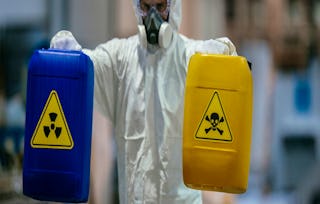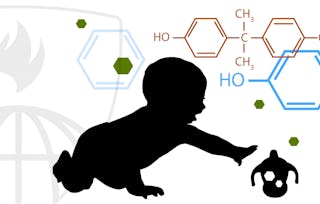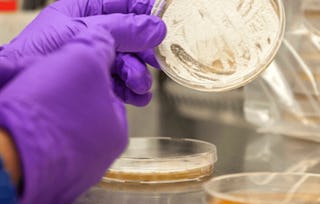This course familiarizes students with the novel concepts being used to revamp regulatory toxicology in response to a breakthrough National Research Council Report “Toxicity Testing in the 21st Century: A Vision and a Strategy.” We present the latest developments in the field of toxicology—the shift from animal testing toward human relevant, high content, high-throughput integrative testing strategies. Active programs from EPA, NIH, and the global scientific community illustrate the dynamics of safety sciences.

Toxicology 21: Scientific Applications
Seize the savings! Get 40% off 3 months of Coursera Plus and full access to thousands of courses.

Toxicology 21: Scientific Applications


Instructors: Lena Smirnova
12,232 already enrolled
Included with
89 reviews
Details to know

Add to your LinkedIn profile
See how employees at top companies are mastering in-demand skills

There are 7 modules in this course
This model will give you a broad introduction to the Toxicology 21st century (Tox21c) field and familiarize you with the main document, which summarize the main ideas and principles of Tox21c.
What's included
10 videos3 readings1 assignment1 discussion prompt
This module will discuss how ToxCast and Tox21 technologies can be used in practice. The US EPA Endocrine Disruptor Screening Program will be discussed in detail and we will demonstrate how the ToxCast platform replaced in vivo tiered approaches in EDSP and, thus, acelerate the process of . In the second lesson of this module, the development of in silico models for toxicity testing will be discussed.
What's included
10 videos4 readings1 assignment1 peer review2 discussion prompts
This module will familiarize you with the Human Toxome Project run by Johns Hopkins University in collaboration with several university, industry, and research agencies. Omics technologies, their advantages and disadvantages, as well as concepts of Adverse Outcome Pathways (AOP) and Pathways of Toxicity (PoT) will be discussed.
What's included
10 videos2 readings1 assignment1 discussion prompt
The first lesson in this module will explain the concept of read-across, why it is important for regulatory risk assessment, and how it can be implemented by industry in response to REACH legislation. The organotypic cultures lesson will teach you about existing in vitro cell-based models starting from simple monolayer cultures of cell lines and ending with complex combined organ-on-a-chip and human-on-a-chip approaches.
What's included
18 videos3 readings2 assignments1 discussion prompt
This module will teach you the role of miRNA and epigenetics in toxicology and environmental health.
What's included
6 videos1 reading1 assignment1 discussion prompt
In this module you will learn about important component of in vitro toxicology such as in vitro to in vivo extrapolation (IVIVE) and physiologically based biokinetic modeling. You will learn why it is important to consider biokinetics in vitro and see some example of biokinetics modeling in vitro. This lesson will also give you a biometry prospective of in vitro toxicology. You will learn which methods can be used to analyze big data.
What's included
8 videos3 readings1 assignment1 peer review
In this lesson you will learn about integrated testing strategies and how they differ from individual tests or test batteries. Also a wrap-up lesson "beyond chemical" will summaries your knowledge from this course and give a out-look for further directions in the field of alternatives to animal testing.
What's included
11 videos2 readings2 assignments
Instructors


Offered by
Explore more from Basic Science
 Status: Preview
Status: PreviewJohns Hopkins University
 Status: Free Trial
Status: Free TrialUniversity of California, Davis
 Status: Preview
Status: PreviewJohns Hopkins University
 Status: Free Trial
Status: Free TrialNovartis
Why people choose Coursera for their career

Felipe M.

Jennifer J.

Larry W.

Chaitanya A.
Learner reviews
- 5 stars
79.77%
- 4 stars
10.11%
- 3 stars
5.61%
- 2 stars
1.12%
- 1 star
3.37%
Showing 3 of 89
Reviewed on May 3, 2018
Very nicely designed course. The instructors offer an excellent and easy to understand overview of a range of promising Tox21 tools and approaches using good examples and illustrations.
Reviewed on Mar 27, 2021
Helpful Course in Understanding Current trend in toxicological testings
Reviewed on May 25, 2020
one of the best course helps students & researcher about what are challenges faced in toxicology in 21 century and finds the routes to develop new routes and methods for toxicology tests

Open new doors with Coursera Plus
Unlimited access to 10,000+ world-class courses, hands-on projects, and job-ready certificate programs - all included in your subscription
Advance your career with an online degree
Earn a degree from world-class universities - 100% online
Join over 3,400 global companies that choose Coursera for Business
Upskill your employees to excel in the digital economy
Frequently asked questions
To access the course materials, assignments and to earn a Certificate, you will need to purchase the Certificate experience when you enroll in a course. You can try a Free Trial instead, or apply for Financial Aid. The course may offer 'Full Course, No Certificate' instead. This option lets you see all course materials, submit required assessments, and get a final grade. This also means that you will not be able to purchase a Certificate experience.
When you purchase a Certificate you get access to all course materials, including graded assignments. Upon completing the course, your electronic Certificate will be added to your Accomplishments page - from there, you can print your Certificate or add it to your LinkedIn profile.
Yes. In select learning programs, you can apply for financial aid or a scholarship if you can’t afford the enrollment fee. If fin aid or scholarship is available for your learning program selection, you’ll find a link to apply on the description page.
More questions
Financial aid available,
¹ Some assignments in this course are AI-graded. For these assignments, your data will be used in accordance with Coursera's Privacy Notice.

